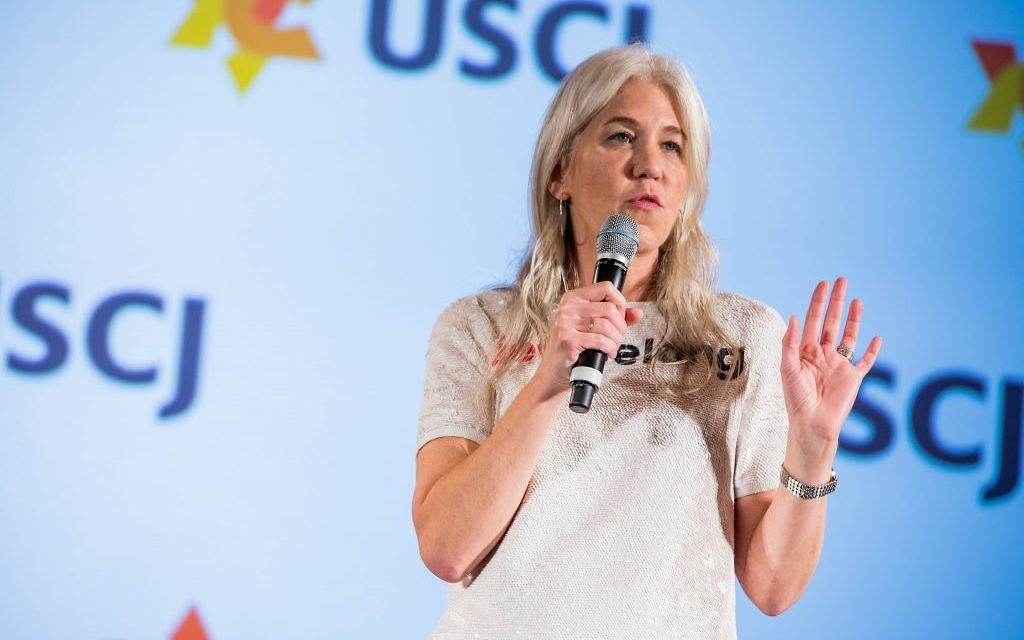Judaism Needs to Tweak Branding, Not Content
The founders of an innovative San Francisco community and an anti-Jewbarrassment initiative offer advice.

Communities must find ways to connect Judaism’s traditional strengths to people who feel left out because of youth, lack of knowledge or other barriers, more than 800 attendees were told at the closing plenary of the United Synagogue of Conservative Judaism biennial convention Tuesday, Dec. 5, at the Marriott Marquis in downtown Atlanta.
“We are not here to create something new but rather translate the precious thing that we have — the Torah, Jewish life, experiences and love for one another — into the present,” said Rabbi Noa Kushner, the founding rabbi of The Kitchen in San Francisco. As part of a network of emerging communities, The Kitchen promotes Judaism among Jewish millennials and people from interfaith backgrounds, with no insiders or outsiders and no “others.”
“I think we’ve made a false dichotomy,” Rabbi Kushner said. “We either focus on having strong content and the Torah or increasing access and branding — it’s either one or the other — and we are forced to pick. But we need to have both.”
Get The AJT Newsletter by email and never miss our top stories Free Sign Up
Making people try something new is part of the experience at The Kitchen and something Rabbi Kushner said can help connect people to Judaism. “We need to start the conversation not with ‘Are you allowed to be here?’ but rather ‘What are you willing to try?’”
People should find a way to connect to the Torah that is meaningful to them, she said. “If religion and the Torah has to do with what is going on in our lives personally but also communally, then we will have a huge role to play.”
She said established community members should give newcomers a chance because they themselves were much younger when they got involved, and someone paved the way for them.

Rabbi Kushner said she finds it condescending when congregations and rabbis ask her how they can get younger people involved. “Who exactly are we referring to when we say ‘the younger generation’ because there are multiple groups?” she said. “Each individual has to find the connection themselves, and we either need to make room or step aside so new things can be born.”
Rabbi Ed Feinstein, the senior rabbi of Valley Beth Shalom in Encino, Calif., said many congregants don’t want to change their leadership roles or the congregation.
Rabbi Kushner said congregations can make room to build a new culture from the ground up. “I think it’s possible to create a separate brand within the community,” she said. “I don’t think it’s hard to create another setting where people enjoy praying, but if people are upset, it may have to do with just wanting to create something for themselves vs. something that will grow and flourish.”
Jewbelong founder Archie Gottesman said congregations need to diminish “Jewbarrassment” and spiritual envy, two core issues tackled by Jewbelong, which strives to make Judaism and Jewish practice more comfortable and easier to understand. It aims to remove embarrassment about a lack of Jewish knowledge as a barrier to Jewish involvement.
There are multiple examples of Jewbarrassment, from speaking after the washing of the hands to forgetting to take the feta cheese out of a salad brought to a kosher home, Gottesman said, but speaking about that embarrassment can alleviate the stigma. “Even talking about it creates connections,” she said. “It doesn’t mean we have to change the rules, but become more sensitive.”
Rabbis are the primary drivers behind a synagogue’s brand, which can determine who will plug into the congregation. “Branding is the voice, language … and overall feel of a product and religion” and is critical to drawing people in, she said.
Jewbarrassment can be dangerous and lead people to feel they are not good enough, Gottesman said, but making Jewbarrassment part of a congregation’s culture can help eradicate it.
“It’s not going to disappear overnight, but if you want to make your synagogue more welcoming, fun and less intimidating, just talk about it,” she said.
Communication also can resolve spiritual envy, which involves feeling self-conscious about the practice of Judaism, Gottesman said.
“What unites us is deeply in question, and the institutions we represent have to change,” Rabbi Feinstein said. “What we create next is going to be what the synagogue represents. … Is our principal job to defend continuity, transmit, preserve and protect, or is it to create something anew?”




comments